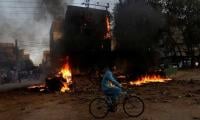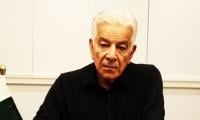and of itself, as does the hectic MoU diplomacy these visits exemplified. Yes, visits to Pakistan by Afghan President Hamid Karzai and US Secretary of State John Kerry have provided insights into this prime minister’s view of regional security, as has his government’s internal pronouncements on terrorism and security. But all of this does not add up to a foreign policy. Not just yet. New York is an opportunity for Mr Nawaz Sharif to change this.
The task before the prime minister is made more difficult by the fact that he has come to be seen as the personification of his government’s foreign policy. Although the prime minister is assisted by two very able advisers on foreign policy – Mr Sartaj Aziz, who joined the federal cabinet as the prime minister’s advisor on national security and foreign affairs; and Amb Tariq Fatemi, who serves as his special assistant on foreign affairs – the foreign affairs portfolio is seen to rest with the prime minister himself. Instead of being seen as a signal of the importance he attached to foreign affairs, it has come to be viewed as quite the opposite.
Pakistan has now been without a full-time foreign minister for 190 days and without a full-time ambassador to the United States for 126 days. Even if some of this (especially the former) is a technicality, the theatrics of this situation is not good and needs to be addressed. Even more important to address is the growing impression that amidst the monstrous problems of energy, economy and extremism that have engulfed him, foreign policy has been rather neglected. New York is an opportunity to change this impression.
This is, of course, not his first visit to New York, or to the United Nations. He will be viewed with new eyes this time, but also in the shadow of past performance. The Pakistan he will speak for next week is a very different Pakistan to the one he had spoken for before. The world he will speak to is also remarkably different. There are at least five things that Mr Nawaz Sharif might say that Pakistan and the world may be interested in hearing.
First, of course, is Syria. Syria will be the great sub-text of this year’s General Assembly. It is not an issue that can or should be ducked. Certainly not by a Security Council member. Syria has been a fast-changing story and water continues to gush under this bridge. But Pakistan’s stance should be clear and unequivocal: the world must stand against chemical weapons but also for internationalism. The arena for action must be the Security Council and the United Nations. What better place to make this argument, and make it forcefully, than at the United Nations.
Second, although more important to Pakistan, is India. The absurdity of the idea that the leaders of India and Pakistan need to travel across two continents and two oceans to New York to be able to – maybe – meet each other, should not be lost on either Prime Minister Sharif or Prime Minister Singh. It may not be a bad idea to remind the world of this absurdity. More importantly, the world should be reminded of Pakistan’s wish, and this prime minister’s own desire, to address this absurdity. The world needs to be told – with honesty and with passion – that Pakistan stands on the side of better relations with all its neighbours, starting with the one with whom it has had the most tortured past.
Third is the issue of terrorism and insecurity. Mr Nawaz Sharif would not be the first to highlight that Pakistan is itself a victim of terrorism. On a nearly daily basis it is Pakistani blood that spills on Pakistani streets, very often shed by Pakistanis themselves. But let Mr Nawaz Sharif be the first to honestly acknowledge the mistakes we have made ourselves. Of course, it will not be easy. But nothing will give more credence to our honest intent to fight this menace than a sincere acknowledgement of our own mistakes. Doing so will also give us firmer ground to stand on when asking others not to make mistakes of their own. In particular, in impressing on the United States – as Pakistan has just done in the Security Council – that its drone campaign is not just bad international practice it is also a self-defeating policy.
Fourth, Mr Nawaz Sharif should recognise – and remind his audience – that the United Nations is as important to international development as to international security. This is the forum to make a declaration of Pakistan’s desire to move from being a security state to a development state. Energy and education are two of the highest priorities for Pakistan’s development, as they are for the world. On energy, in particular, Pakistan has generally failed to connect to the global transformational efforts being made in the areas of renewable and alternative energy. Here is an opportunity to express a commitment to change that.
Finally, a word on the larger challenges that confront the planet. Even though it may surprise the prime minister himself, Pakistan has an illustrious history of punching above its weight on the most weighty of global issues. Whether it was the human development index, global climate change, or food and agriculture, Pakistanis have valiantly led as global citizens even when their own government lagged behind. Our diplomats at the UN – including those serving now – are considered to be amongst the most accomplished. Our very first ambassador to the United Nations was an intellectual of the calibre of Patras Bokhari. Maybe more to himself than anyone else, the prime minister needs to recognise, embrace and build upon this legacy of global citizenship. The link between climate change, water, and energy would be the one to make. Not just for the UN audience but for those in Pakistan.
One understands, of course, that the above is a tall order. An unlikely agenda. But can one not hope? Where better to do so than at an institution itself built on hope.
Good luck, Mr Prime Minister.
The writer has taught international relations and diplomacy at Boston University and at the Fletcher School of Law and Diplomacy and was the vice chancellor of LUMS.
Twitter: @adilnajam
Most recently US presidential elections demonstrated how AI has amplified partisan split through turbocharged...
Few years ago, Pakistan ranked as fourth-largest freelancer market globally, with potential to become number one
Arts Council Karachi celebrated its 70th birth anniversary at inaugural session with big cake
There are over 11 million Pakistanis settled abroad, out of which around six million work in Gulf and Middle East
This year alone, US Treasury would have to roll-over $10 to $14 trillion in maturing short-term debt
Tear gas no longer marks just protest sites; it paints entire cities as battlegrounds but then again, PTI did it first







